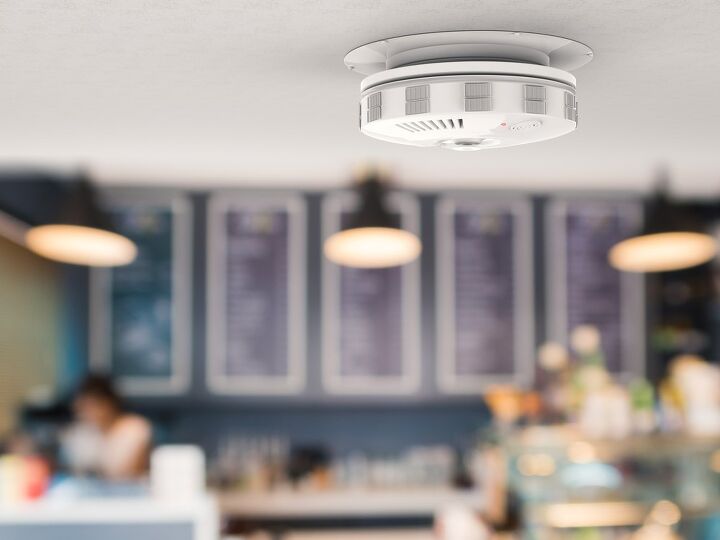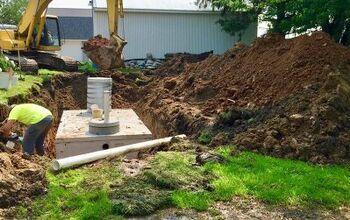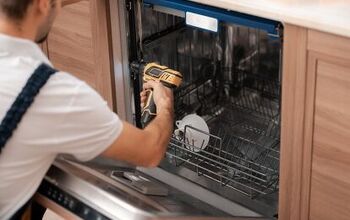Hard Wired Smoke Alarms Goes Off For No Reason? (Do This!)

Being woken up by a smoke alarm in the middle of the night is bad enough but it is even worse when it is a false alarm.
Plus, it can send you into a panic when everything is actually fine, so it’s no surprise you want to fix the issue. But what’s the cause when hard wired smoke alarms are going off for no reason? Well, actually, there are several reasons — just not smoke or fire.
Hard wired smoke detectors go off for no reason when there’s a low or dead battery, dirt in the smoke detector, or a power surge. Smoke detectors can go off when there is steam or high humidity in the house, as well as burnt food. To avoid the alarm, clean the smoke detector itself if it is dusty and check the battery.
Many people have no idea there is more than one kind of smoke detector. But actually, there are two types of smoke detectors, which include photoelectric and ionization.
Because they both specialize in different types of smoke detection, let’s first see which one you have in your home.
Do You Need to Hire an Electrician?
Get free, zero-commitment quotes from pro contractors near you.

Which Type of Smoke Detector Do I Have?
As mentioned previously, there are two types of smoke detectors, photoelectric and ionization. They are both useful for detecting fires, but they work differently.
Ionization detectors sense fires with a lot of flames first. Sometimes they do not detect a smoldering fire until there is a lot of smoke in your home. However, these are the most common because they have been around the longest and are less expensive.
The way they work is by using a tiny amount of americium 241 to sense the positive and negative ions in the detector, creating an electric circuit. When enough smoke enters your smoke detector, it breaks the path and sets off the alarm.
Photoelectric detectors are more sensitive than ionization detectors. They use a beam of light like a laser pointer that shoots across the inside of the detector. When smoke gets into the detector, it blocks the light beam and sets off the alarm.
Since both types of detectors work in different ways, it is best to have both types in your home. In fact, the National Fire Protection Association (NFPA) recommends using both types of detectors.
Video: Troubleshooting a Smoke Detector That Goes Off
Reasons For Hard Wired Smoke Alarms Going Off For No Reason
First, let’s talk about some possible reasons why your hard wired smoke detector is going off for no reason. After all, it is not going off for no reason at all. There is a reason.
That reason may just not be a fire. These reasons are all important and will help you to understand how your smoke detectors work.
1. Burning Your Food
It has probably happened to all of us. While cooking, you may leave something in the oven too long or cook in the pan longer than it should be. When this happens, smoke fills the air and when it gets near the smoke detector, it will let you (and everyone else in the house) know about it.
The best thing to do is to take the food out of the oven or the pan off the stove, open the windows, and press the reset button. Then, wave the smoke away from the smoke detector. If you have an overhead fan or oven fan, turn that on as well. The smoke detector should stop as soon as the smoke clears.
2. Low or Dead Battery
Whether your smoke detector is hard wired or not, it has a battery. And if that battery is getting low, your detector will let you know. The battery is important in a hard-wired detector as a backup in case the power goes out.
The obvious fix for this is to change the battery, right? Well, yes, but you also have to make sure it is put in correctly. Sometimes they can be put in loosely or may not be connected at all. After you put a new battery in, press the test button and listen for a beep.
Important tip: If you have a hard-wired smoke detector, make sure you turn off the power to your detector before changing the battery.
3. High Humidity Or Steam
If your smoke detector happens to be in close proximity to one of your bathrooms, a hot shower may be the cause. Just opening the bathroom door after a shower can cause the hall smoke detector to go off. Consider moving that detector or just do not open the door until the steam goes away.
4. Chemical Smells or Spills
Sometimes just cleaning your home can cause the smoke detector to misbehave. If you are using ammonia or other strong chemicals to clean and have all the windows closed, your smoke detector may go off. This is to let you know there are high levels of chemicals in the house.
If the chemicals from your cleaning is setting off the detector, you are using too much and may be inhaling dangerous amounts of fumes. Open the windows, turn on the fans, and stop using so much of whatever chemical you are using.
5. Dust On The Detector
If you have too much dust buildup in or on your smoke detector, it will chirp to let you know. It will also cause false alarms since the dust blocks the detector, making it think there is smoke in the room. Follow these steps to clean your smoke detector.
- Step One: Turn off the power to the smoke detector at the breaker box.
- Step Two: Remove the cover from the detector. Some of them are just snapped on while others require you to remove a screw or two.
- Step Three: Use a small duster or hand vacuum to gently clean the dust out of the inside of the detector. You can even use a damp cloth if there is a lot of buildup.
- Step Four: Replace the cover and wait to see if the detector goes off again.
6. Improper Installation
Some smoke detectors have an interconnect wire (orange wire) used for connecting smoke detectors together. This is to make all the smoke detectors go off if one goes off.
It is a safety feature used in large homes and businesses, and it can make it seem like your hard wired smoke alarm is going off for no reason. If the interconnect wire is grounded, the detector will beep periodically until you fix it.
Fast Fact: Sometimes, burning incense will set off your smoke alarm too.
7. Electrical Power Surge
Has there been a power surge or interruption in your electricity when your hard-wired smoke alarms are going off for no reason? For example, if the power goes out during a storm, your smoke detectors may go off to let you know they are disconnected. A loose wire can also cause this problem.
To fix this, go to the breaker box and turn off the breaker to the smoke detectors. If you do not see one labeled for the detectors, turn it off at the main breaker. Wait a few minutes and switch it back to the on position. This should fix the problem.
8. Dirty Furnace
You may have a dirty furnace or furnace filter. You know that smell you get when you turn your heater on for the first time of the season? That can trigger a false alarm in your smoke detectors as well.
If a dirty furnace is to blame, there’s an easy fix. Just go around and reset each smoke detector and it should stop. Then, make sure to clean or replace your filters so it doesn’t happen again.
9. Check Your Fireplace
If your fireplace is putting out more smoke than usual, this can set off the smoke detector as well. This may be from wood that is too fresh or too wet. Wood should be dry and aged for about a year for best burning. The damper may be closed, or your flue may be blocked. Put the fire out, figure out what the problem is, and fix it.
Do You Need to Hire an Electrician?
Get free, zero-commitment quotes from pro contractors near you.

How Often Should I Change the Battery in My Smoke Detector?
Some people think that because their smoke detectors are hard-wired to their homes that they do not have to change the battery as often. This is not true. The NFPA suggests you change your smoke detector batteries every six months. Most people do it when they set their clocks back in the fall and forward in the spring.
In addition, some smoke detectors claim that you do not have to change the batteries for 10 years due to their 10-year life alarm technology. You should still change your batteries every six months no matter what the manufacturer says on the box. It is better to be safe than sorry when it comes to the life of your family and home.
The NFPA does recommend that you replace your smoke detectors at least every 10 years though. They do not last forever, even if they never go off. Each unit is tested before being placed on the market and after 10 years, you never know if they are still operating as they should be. Do not take that chance; replace them every 10 years anyway.
Related Guides

I am a DIYer who loves writing about anything home-related. When I am not writing, you can find me studying for my PhD in Psychology, photographing nature, and swimming at the lake with my grandkids.
More by Patricia Oelze



























